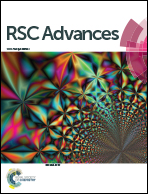Chinese chive and Mongolian leek suppress heterocyclic amine formation and enhance nutritional profile of roasted cod†
Abstract
Heterocyclic amines (HAs) are potent mutagens, which can form DNA adducts in various human tissues. There is increasing evidence that mutagenic HA formation and nutrition loss can occur concurrently in fish during vigorous heat treatment. Our study investigated the effects of five Allium spp. (garlic, onion, welsh onion, Chinese chive, and Mongolian leek) on reducing HA formation and improving nutritional quality of roasted cod (Gadus morhua). The results showed that cod patties pretreated with powders of the selected Allium spp. had significantly (P < 0.05) lower levels of HAs (82–92%, except garlic, 49%) than the control. The contents of 2-amino-1-methyl-6-phenylimidazo[4,5-b]pyridine (PhIP) in the patties exhibited strong negative correlations with total antioxidant activity (−0.937), phenolic (−0.948), and lipophilic flavonoid (−0.933) contents, whereas the 2-amino-3,8 dimethylimidazo [4,5-f] quinoxaline (MeIQx) (made up only ∼0.7–3% of total HAs) contents exhibited significant positive correlations with these antioxidant parameters. In terms of nutrient composition change, Chinese chive and Mongolian leek were the most effective in preventing oxidative degradation of proteins and unsaturated fatty acids in roasted cod patties, which was translated into significantly higher contents of soluble proteins, essential amino acids, and polyunsaturated fatty acids. This has been the first report on the strong HA-formation inhibitory effect of Chinese chive and Mongolian leek. The dual beneficial functionality of these two Allium spp. may be utilized to reduce the intake of hazardous by-products while enhancing the nutritional and antioxidant properties of roasted cod and probably other protein-rich heat-processed foods.



 Please wait while we load your content...
Please wait while we load your content...